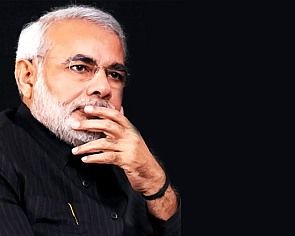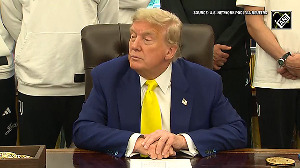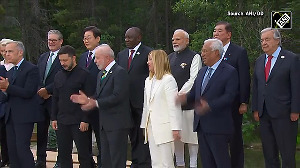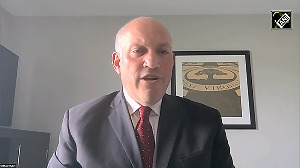 Describing the Narendra Modi-led BJP's electoral victory as a "breathtaking landslide", eminent American think tanks and experts have said the win has given him an opportunity to "redefine" Indian politics.
Describing the Narendra Modi-led BJP's electoral victory as a "breathtaking landslide", eminent American think tanks and experts have said the win has given him an opportunity to "redefine" Indian politics.
"This is a breathtaking landslide that is a victory not only for Modi but for the Indian people who have spoken out clearly against economic mismanagement and policy paralysis," said Ashley Tellis of Carnegie Endowment for International Peace.
"Hopefully, Modi's election will open new doors for correcting the problems in the Indian economy, and if so, that is good news for US-Indian relations. But Washington still has much work to do before it can translate what may be welcome news for US business into better bilateral relations," he noted.
"A single party with an absolute majority gives Modi the opportunity to re-define Indian politics in a way that the Congress did for many decades before. And if Modi sticks to his winning formula... he could remain India's prime minister for a long time to come," Tellis said.
US business can expect a more stable, friendly environment and will be quick to grow, said Richard Rossow, the Wadhwani Chair in US-India Policy Studies at the Centre for Strategic and International Studies.
"Lots of potential direct investment has been on the sidelines in the last few years, hoping for a more friendly business environment," he said.
"Institutional investors have already been jumping back into India, with the expectation of a BJP victory. But it is unclear if the BJP will roll back some of the specific policies (tax, patents, local manufacturing mandates) that have angered a vocal minority of US companies," Rossow said.
However, Rossow said the government-to-government relations will start slowly, particularly those involving the US Department of State, due to the visa denial hangover.
"But we can expect a renewed interest in defence collaborations, combined with renewed business interests, which will, once again, drag the US government's attention back toward India," he said.
Former diplomat couple Teresita and Howard Schaffer, said, "the 'Modi wave' reflects both aspirations and intense disaffection with the ineffectiveness the Congress government displayed in its second term. Expectations are high; meeting them will be an unusually great challenge."
"Government decisions can have a great impact on India's economy but some sticky structural features may not be possible to fix with short term administrative measures," they said.
Russell Green, the Will Clayton Fellow in International Economics at RiceUniversity's Baker Institute for Public Policy and an adjunct assistant professor of economics at Rice, said, "Modi's election victory in India will be interpreted as a big win for the economy."
Green, who served as the US Treasury Department's first financial attache to India from 2008 to 2011, said during India's fast growth of the last decade, the needs of the economy for public goods like power, roads and public administration outpaced the government's capacity to provide them.
"Since 2010, a weak prime minister and corruption scandals further reduced government performance. The bottleneck has become so restrictive that investment has nearly ground to a halt," he said.
The historic victory of Narendra Modi and the BJP challenges several pieces of received wisdom about contemporary Indian politics, said Milan Vaishnav of Carnegie Endowment for International Peace.
"First, the BJP has shown an ability to transcend historical political and geographic boundaries, which have largely relegated it to a party of the north and west of India," he said.
"Second, the BJP manufactured a number of highly effective alliance partnerships, which it has failed to do in the last two election cycles. This was seen as an area where the Congress had a distinct advantage over the BJP," Vaishnav said.
"Third, since 1984, single party majority governments have been viewed as obsolete. Although the BJP will likely carry on with its alliance to form a government, it will do so out of choice rather than necessity," he said.
"Finally, regional parties which had been ascendant since 1989, have taken a hit these elections. Their vote share, which had peaked at 53 per cent in 2009, looks to fall short of the half-way mark," Vaishnav opined.
According to Tellis, the real unanswerable question now is the future of India's grand old party, the Congress.
"It is too early to declare its demise. But clearly dynastic politics has been discredited as has economic populism. If the Congress brings to the fore a new generation of leaders -- who already exist in its midst--it stands a second chance," he said.
"For India's sake, the Congress must thrive as an alternative. The success of Indian democracy requires clear political alternatives," Tellis said.
Leela Fernandes, professor of political science at University of Michigan, said "The more significant issues at hand are what the elections mean for the future of Indian politics."
"The presence of a strong opposition party is as important to a strong democracy as the ability to produce a stable government with a clear majority for a single party," Fernandes said.
Brian Min, assistant professor of political science from the University of Michigan, said the "Congress' strategy to lure rural voters by promising lavish new spending did not work this time around. It no longer seems that Indians feel locked into voting for the same party over and over."











